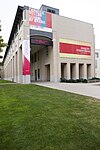Center for Arts Management and Technology
AC with 0 elementsCarnegie Mellon UniversityNortheastern United States university stubsPennsylvania school stubsPittsburgh building and structure stubs
The Arts Management and Technology Laboratory (AMT Lab), formally known as Technology in the Arts and Center for Arts Management and Technology (CAMT) is an applied research center at the Heinz College at Carnegie Mellon University in Pittsburgh, Pennsylvania. Founded in 1996, CAMT researches ways in which technology can successfully support professionals in arts management and develops solutions to meet critical needs.
Excerpt from the Wikipedia article Center for Arts Management and Technology (License: CC BY-SA 3.0, Authors).Center for Arts Management and Technology
South Dithridge Street, Pittsburgh
Geographical coordinates (GPS) Address Nearby Places Show on map
Geographical coordinates (GPS)
| Latitude | Longitude |
|---|---|
| N 40.4442 ° | E -79.94539 ° |
Address
Carnegie Mellon University
South Dithridge Street
15213 Pittsburgh
Pennsylvania, United States
Open on Google Maps








